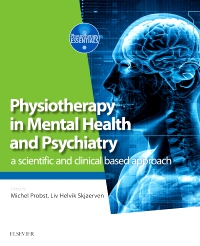
Physiotherapy in Mental Health and Psychiatry, 1st Edition
Paperback

Now $62.06
A brand new and must have textbook for the students and practising physiotherapists which acts as a trusted guide on the different perspectives, contexts and approaches across the spectrum of mental health and psychiatry settings. Grounded in theory and clinical practice, it covers a range of widely-used evaluation tools and treatment methods for specific syndromes and pathologies which will help physiotherapists to signpost and identify the care needs of their patients within both individual and group therapeutic settings. Case studies ensure that the theory discussed is applied to various practical scenarios after which reflective exercises are used to reinforce learning and understanding.
-
- First internationally-relevant textbook for physiotherapists covering a range of mental health and psychiatry settings
- Ideal confidence booster for both students and practitioners new to the subject
- Contributed by world-leading academics, clinicians and researchers in the field
- Advocates a scientific and clinical based approach with patient at centre
- Concepts applied to practice with case studies
- Multi-perspective views and approaches to human movement and function
- In-text reflective learning exercises
-
Section 1 INTRODUCTION
1 Introduction to Physiotherapy in Mental Health and Psychiatry
Section 2 PSYCHOLOGICAL MODELS USED IN PHYSIOTHERAPY IN MENTAL HEALTH
2.1 From A Biomedical to More Biopsychosocial Models in Physiotherapy in Mental Health
2.2 Phenomenology – A Source of Inspiration
2.3 Perspectives on Human Movement, The Phenomenon of Movement Quality and How to Promote Movement Quality Through Movement Awareness as Physiotherapy in Mental Health
2.4 Improving Adherence to Physiotherapy in Mental Health Settings: The Need for Autonomy, Competence and Social Relatedness
2.5 Activephysio: Acceptance and Commitment Therapy (Act) For the Physiotherapist in The Area of Chronic Pain
Section 3 METHODOLOGIES WITHIN PHYSIOTHERAPY IN MENTAL HEALTH AND PSYCHIATRY
3.1 Norwegian Psychomotor Physiotherapy, A Brief Introduction
3.2 Basic Body Awareness Therapy (Bbat): A Movement Awareness Learning Modality In
Physiotherapy, Promoting Movement Quality
3.3 Psychomotor Therapy or Physiotherapy In Mental Health For Patients With Psychiatric Problems
3.4 Prescribing Physical Activity In Mental Health Care Settings
3.5 Relaxation Therapy
3.6 The Added Value Of Biofeedback For The Psychosomatic Physiotherapist
3.7 Group Therapeutic Factors For Use In Physiotherapy In Mental Health: A Core In Group Physiotherapy
Section 4 OBSERVATION AND EVALUTION TOOLS
4.1 Observation And Evaluation Tools Within Physiotherapy In Mental Health
4.1.1 The Louvain Observation Scales for Objectives in Psychomotor Therapy
4.1.2 Exercise and Eating Disorder Questionnaire
4.1.3 Physical Activity and Unrest Test
4.1.4 The Global Physiotherapy Examination (GPE-52)
4.1.5 The Global Body Examination
4.1.6 Body Awareness Rating Questionnaire (BARQ)
4.1.7 The Body Awareness Scale Movement Quality and Experience (BAS MQ-E)
4.1.8 Body Awareness Rating Scale - Movement Quality (BARS-MQ)
4.1.9 ‘ABC’—the Awareness Body Charts: A New Tool Assessing Body Awareness
4.2 Nonphysiotherapeutic Observation And Evaluation Tools
4.2.1 Four-Dimensional Symptom Questionnaire (4DSQ)
4.2.2 Self-Concept and the Physical Self-Concept
4.2.3 Physical Self-Description Questionnaire
4.2.4 Physical Self-Perception Profile
4.2.5 Physical Self-Inventory
4.2.6 Rosenberg Self-Esteem Scale
4.2.7 Physical Activity and Exercise Questionnaires
4.2.8 Motor Assessment Instruments
4.2.9 Standardised Motor Assessment Instruments for Adults and Elderly
Section 5 PHYSIOTHERAPY WITHIN MENTAL HEALTH AND PSYCHIATRY CARE. SPECIFIC
INTERVENTIONS DURING LIFE SPAN: CHILDREN, ADOLESCENTS, ADULTS AND ELDERLY
5.1 Physiotherapy In Mental Health Care
5.1.1 Musculoskeletal Pain: Evidence and Critical Factors in Rehabilitation Relevant for Physiotherapy in Mental Health
5.1.2 Touching the Lived Body: Integrating Myofascial Bodywork and Body Awareness in Mental Healthcare Practice
5.1.3 Norwegian Psychomotor Physiotherapy Treatment: Change and Communication in a Long-Term Perspective—Presentation of Results From Clinical Based Research
5.1.4 Best Practice: Basic Body Awareness—Therapy Evidence and Experiences
5.1.5 Physiotherapy for Patients With Nonspecific Chronic Low Back Pain and Comorbid Mental Illnesses
5.1.6 Physiotherapy Interventions in Individuals With Chronic Widespread Pain or Chronic Fatigue Syndrome
5.1.7 The Role of Adaptive Pacing Therapy and Graded Exercise in Treatment for Chronic Fatigue Syndrome and Myalgic Encephalomyelitis
5.1.8 Medically Unexplained Physical Symptoms
5.1.9 Distress and Stress Overload
5.1.10 Physiotherapy Interventions in Individuals With a Burnout
5.1.11 Working in General Practice Treating People With Comorbid Mental Health Problems
5.2 Physiotherapy In Psychiatric Care
5.2.1 Physiotherapy for Trauma Survivors
5.2.2 Physiotherapy for Sexualy Abused Women
5.2.3 Physiotherapy and Substance Misuse
5.2.4 Physiotherapy and Patients with Eating Disorders
5.2.5 Physiotherapy for Patients with Depression
5.2.7 Conversion Syndrome and Physiotherapy
5.2.7 Physiotherapy within the Multidisciplinary Treatment of Schizophrenia
5.2.8 The Need of Embodiment in Patients With Schizophrenia Spectrum Disorders: A Physiotherapeutic Perspective
5.2.9 Physiotherapy for People With Bipolar Disorder: A Systematic Review
5.3 Physiotherapy For Children And Adolescents
5.3.1 Physiotherapy in Mental Health With Children and Adolescents in Belgium
5.3.2 Creating Space for Youth in Physiotherapy: Related to Gender and Embodied Empowerment
5.3.3 Physiotherapy for Children With Intellectual Disabilities
5.4 Physiotherapy for Elderly
5.4.1 Physical Activity in People With Dementia: Clinical Recommendations for Physiotherapists
5.4.2 Pain Assessment in People With Dementia

 as described in our
as described in our 